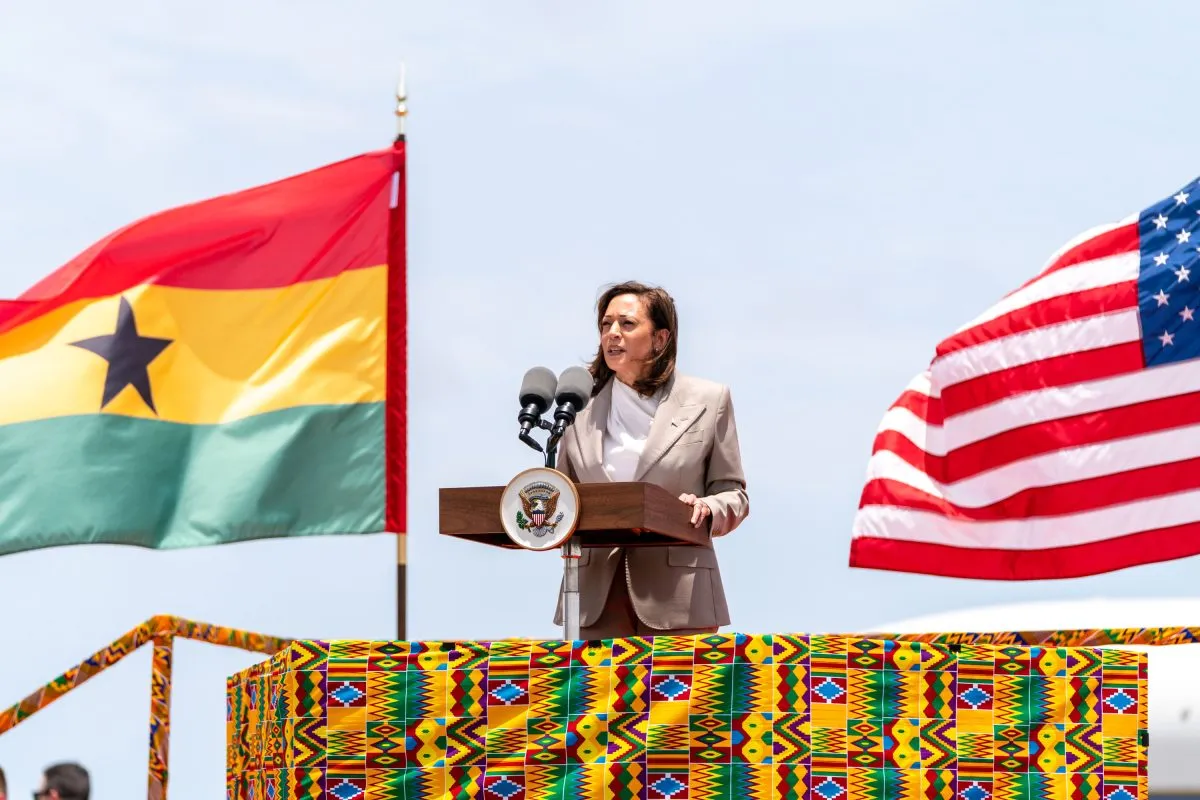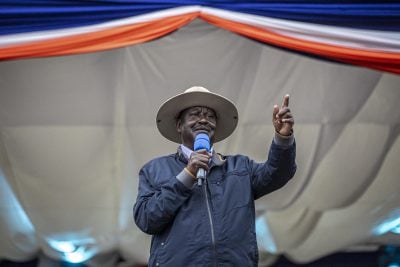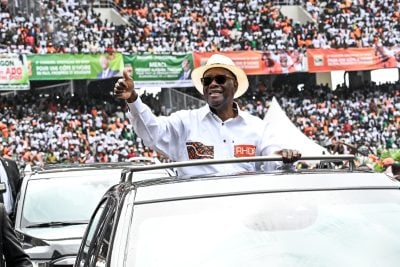US Vice-President Kamala Harris started a weeklong trip to Africa on 26 March in a bid to ramp up US investment on the continent and counter the rising influence of Russia and China.
As she touched down at Kotoko International Airport in Accra, Ghana, greeted by a fanfare of drums and school children, she said the trip underscores “the very important relationship” between the US and Africa.
“On this trip I intend to do work that is focused on increasing investments here on the continent and facilitating economic growth and opportunity specifically in the areas of economic empowerment of women and girls, empowerment of youth entrepreneurship, digital inclusion, and to support the work that must be done to increase food security, including adaptation to the effects of the climate crisis.”
As her visit to Ghana got underway on 27 March, the vice-president announced an investment of $100m in Ghana, Côte d’Ivoire, Benin and Togo to help deal with the threat of violent extremism and instability.
The US also announced $139m in bilateral assistance to economic, business and cultural initiatives, as well as support for an anti-malaria project. Harris’ office also outlined plans to send a special resident advisor to Ghana to help President Akufo-Addo’s government restructure its debt.
On Wednesday Harris went to Tanzania from March 29-31, with her final stop in Zambia, on March 31-April 1.
Harris wrapped up her historic trip in Zambia where she urged Zambia’s creditors to speed-up the re-structuring of Zambia’s debt.
“We are continuing to reiterate our call on official bilateral creditors to provide meaningful debt reduction to Zambia,” Harris said.
Zambia owes more than a third of its debt to Beijing, that has been widely criticised by international financial organisations and Western governments for allegedly blocking Zambia’s efforts to restructure its debt.
At a press briefing in Lusaka, she also announced more than $16 million in investment for new programs in Zambia, including a focus on anti-corruption and other reform efforts. She also unveiled the signing of a deal to strengthen business ties “which will help to develop and implement commercial projects and increase the flow of goods and services between our nations.”
As she concluded her week long visit she also announced $7bn in private sector and US government commitments to lift-up over 116 million farmers and promote climate-smart agriculture.
“I am proud to have secured $7 billion in private sector commitments that will support climate resilience, adaptation, and mitigation across the continent of Africa.”
Wooing Africa
Washington’s latest charm offensive is a continuation of US President Joe Biden’s strategy to reclaim its role as a major player in Africa, and as a counter to the growing influence of Russia and China, experts say.
“In international affairs we gauge the value of a partnership between countries, between regions, in the regularity of high-level exchanges,” says Gyude Moore, a senior policy fellow at the Washington DC-based Center for Global Development (CGD).
Up until 2009, the United States was the continent’s largest trading partner, but since then it has been overtaken by Beijing, with two-way trade between the United States and Africa dwindling from $141bn in 2008 to $64bn in 2021.
By contrast China’s trade with the continent topped $264bn in 2021, growing an additional 11% in 2022 to $282bn.
“The United States is ready to stake a claim to a role it held before,” Moore says.
One reason for this precipitous drop in US-Africa trade is a decline in African oil imports by the US as it bids to become energy self-sufficient.
This emphasises the lack of variation in traded goods between the two countries, and Africa’s inability to add value and diversity to its exports, while US investment in the continent is limited to a few sectors, Moore says.
“All those things are what the Biden administration is trying to change.”
The Prosper Africa initiative, introduced under the Trump administration, is making it easier for American capital and firms to invest on the continent, by working with the private sector and African government partners to advance deals, promote market opportunities, and strengthen business and investment climates.
For the last 22 years the primary trade mechanism between the US and Africa has been the African Growth and Opportunity Act, or AGOA, which allows up to 1800 African products tariff and quota free access to the American market. But the agreement doesn’t give US companies reciprocal access to Africa, and it expires in 2025.
Critical US interests
In December, the Biden administration shut down the nation’s capital for a week to roll out the red carpet for over 40 African heads of states at the US-Africa Leaders’ Summit.
During the summit Biden unveiled $55bn in investments, topping the pledges made by both China and Japan at their recent Africa-focused summits.
China pledged $40bn in African investments at the latest Forum on China-African Cooperation (FOCAC) in November 2021, while Japan committed $30bn to African development at TICAD 8 in Tunisia last year.
One critical reason for the rapprochement is that 30% of the critical minerals required for the transition to net zero lie in Africa’s rich seams.
However, China dominates the supply chain of critical minerals, controlling 40% of nickel and more than 90% of rare earth elements worldwide.
With Africa poised to be a major player in the future of rare earth minerals, it makes “absolute sense” that the US is turning their attention to the continent, Moore says.
At the same time, as the world becomes more interconnected, the US is seeking to contain the spill-over of threats emerging from Africa, such as terrorism, pandemics, and the impacts of climate change.
All these investments advance US national security and economic interests, Moore says.
“As it is with foreign policy, there are no free lunches. Every country is acting in its own national interest, regardless of the rhetoric.”
Want to continue reading? Subscribe today.
You've read all your free articles for this month! Subscribe now to enjoy full access to our content.
Digital Monthly
£8.00 / month
Receive full unlimited access to our articles, opinions, podcasts and more.
Digital Yearly
£70.00 / year
Our best value offer - save £26 and gain access to all of our digital content for an entire year!

 Sign in with Google
Sign in with Google 



